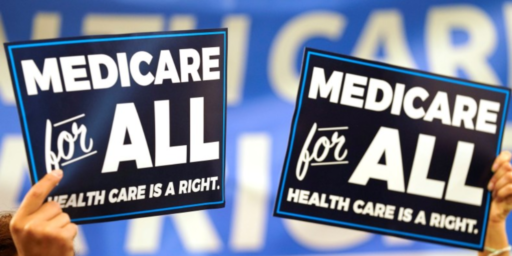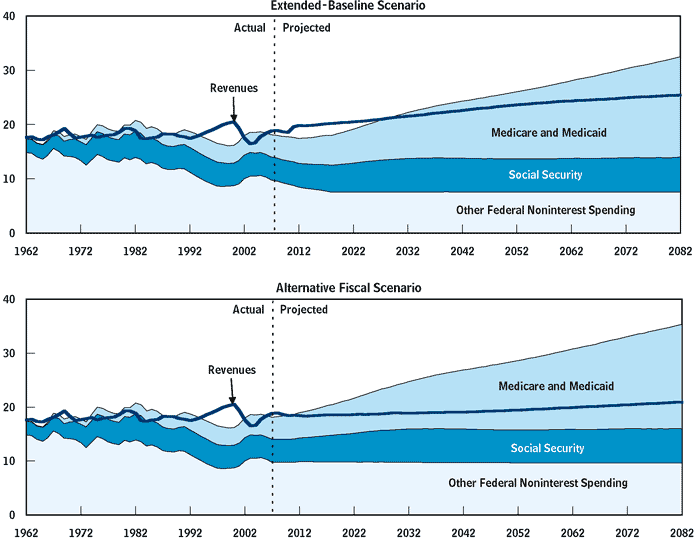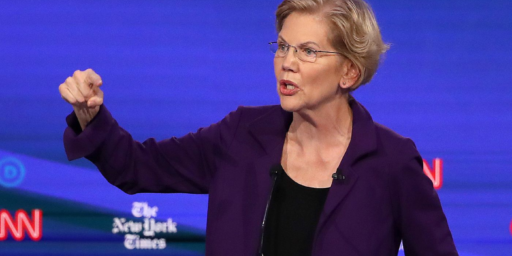Bush a Commie Mole?
Maybe Nathan Newman is onto something here. Bush’s Medicare Prescription Drug Program (or as I like to call it the Blackhole) is not only going to be insanely expensive (when Medicare is already slated to run-up a huge deficit), but is also ridiculously complicated for those who sign up. Bush’s policies really don’t strike me as being overly market friendly in that he loves spending the government money not only collected today, but that will collected in future years (most people call this deficit spending).
Of course, one thing Nathan misses is that most government programs are usually like this. They are either mind staggeringly complex, or they offer no choice. Note the problem Nathan highlights,
Bush administration officials said Medicare drug plans were offering more benefits at lower cost than had been expected. But that does not mean that a person’s local pharmacy will be in every plan. “In some rural areas,” Ms. Lenker reported, “beneficiaries say: ‘There are 40 Medicare drug plans to choose from, but my pharmacy takes only one or two plans. How does that give me choice?’ “–link
In other words, the problem is that some people want choice, but they don’t get it because their pharmacy doesn’t offer that many plans. Nathan’s solution: simplify it. That sounds quite a bit like creating one single plan. That offers no choice either. I suppose one could make that single plan very flexible, but the problem is that such a plan would likely be very expensive.
The problem is that we are not talking about insurance or any other type of market activity anymore. Medicare and the prescription drug program that go with it are subsidy programs. If you have a pre-existing condition, no problem you still qualify. This means that a person’s “premium” should be equal to their treatment costs. With Medicare this is not the case and hence it is a program that subsidizes the consumption of health care resources (gee could this be one factor contributing to the rise in health care costs?). Offering a simple but “flexible” plan will simply mean larger subsidies. Or even more simply put, Medicare is likely going to run out of money even faster. And if you think Social Security running out of money is scary, please don’t look at the dollar figures for Medicare, you’ll likely soil yourself right were you sit.
But, it seems the liberals/Democrats have pretty much won this fight, after all even a whacked out conservative nut like Bush is going down the same road. My big objection is that the liberals and Democrats aren’t honest about it. They don’t say, “Look, we need to raise taxes on everybody and by alot to pay for these existing programs. Oh, and we’ll be back to raise taxes again when we propose new programs.” Instead they have this silly belief that if everybody has access to health care that costs will somehow decline.
Some fall for that bromide that an ounce of preventioin is worth a pound of cure. While true in some cases it isn’t true in others. How do you prevent leukemia, autism, breast cancer, Chron’s disease, etc.? Don’t know? Well don’t beat youseld up about it as doctors and researcher’s don’t know either. So this notion of lowering costs this way is highly dubious.
Some argue that administration costs can be cut. Really? You mean we’ll turn this over to government and we wont get a huge bloated money sucking agency? Personally I find this one to be a bit hard to swallow. The government usually excells at creating more administration not less. New rules for this, that, and the other thing. This means new forms, in triplicate, that need to be filled out. Government agencies, to put it mildly, are not usually thought of as the paragons of efficiency and cost control. After all, there is little to no incentive to be efficient or cut costs. A firm lives or dies by profit. Maximizing profits implies minimizing costs. There is no profit maximization objective for a government bureaucracy. One could argue that election outcomes provide some incentive, but that strikes me as weak. The seperation between voting outcomes strikes me as to far removed from the day-to-day operations of most bureaucracies.
The last argument I’ve seen that even with a subsidy people aren’t going to start going to the hospital in droves. After all, a triple bypass is not fun and people aren’t going to do it if they don’t need it. While this is true, there are two problems with this argument. First, it is an irrelevant argument in terms of reducing costs and/or the growth of costs. All this argument says, if it is true, is that people aren’t going to increase their usage. Or to put it another way, that subsidizing health care consumption for everybody wont increase costs. Of course, this latter conclusion is also dubious. After all, there was a recent report that people in the U.S. do put off medical treatment of ailments due to cost. Remove the cost barrier and those people will most likely seak treatment which will raise costs.
In short, the idea that we can reduce health care costs by subsidizing health care consumption (alone) sounds about as sensible as reducing one’s weight by overeating. Of course, we could still subsidize health care and reduce costs, but it would require another step or steps. Some possibilities would be to make some procedures effectively illegal as in Canada and fertility treatments. Another is to increase non-pecuniary costs such as longer wait times. A third is to simply set the health care budget at some fixed amount and when that is gone, then no more until the budget is set again. Of course, this would mean a decline in health care quality for the most part. My guess is that the Democrats/liberals will continue to plug some sort of health care reform without the need to raise taxes, and Republicans will continue to avoid looking for market based solutions, and in the end will end up with something really, really expensive and bad.






Yup. That’s the reason I’ve been pressing those who want a market-based solution to start looking for something that could actually gain political traction.
Proposals to create a market in health care might be a good start.
Trial lawyer greed, public sector greed, union greed and free health care for the poor and illegal are what is driving up the cost of medical care. Over use of the facilities by those who have all the tax-payer supplied health insurance is a costly problem.
People in the U. S. who don’t have prescription drug insurance (free for the greedy public sector fat cats) pay the highest prices in the world for medicine. Nobody in the world pays as much, per unit of medicine, as I do. I, and people like me, pay the largest portion, per unit of drugs, of the cost of developing the medicine for the world.
The best way for Uncle Sam to be involved in funding health care is through the user, not the provider. The new prescription drug coverage does that; it provides a public subsidy for the development of drugs through the user of the drugs. The ever stupid, and hypocritical, left has to be kept as far as possible from our health care providers, and this plan helps do that.
I continue to look for actual proof of this claim. I’d appreciate any you can direct me to. Note: demonstration that people spend less on health care when they have less to spend is not proof of overuse.
Why don’t you drive a Mercedes or have a jet on standby? It is too costly and the money comes from your own pocket. If your employer was forced to supply these items, free to you, you would be driving a Mercedes, or equivalent, and you would be flying to meet friends for weekends in exotic locales.
Obviously this screed of mine is rhetorical; for all I know you do drive a Mercedes, and deserve to. I do make a point though, the best way to ration health care is through the user, and his pocketbook.
The left is, believe it or not, coming to the realization that some sort of health care rationing is necessary. They claim collective coercion is how it should be done. I claim that any rationing is best done through individual choices.
There is another factor in the health care cost complex and that is the enormous innovation, and its attendant costs, in diagnostic equipment and in its use. This is a great boon for the young and middle aged, but largely paid for out of medicare and taxpayer funded insurance.
I hope that the younger public understand that we older folks are funding reasearch, and development, that will be of major benefit to you.
great article, one more concern is an increase in government interference in private lives, like maybe dubious mandatory “prevention programs”, or maybe the “wait for service until you die” program